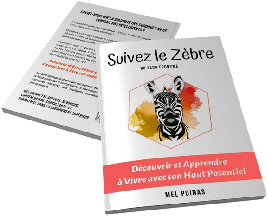Article updated on September 20, 2022
HPI = Hypersensitive?
This article has been on my mind for a while! Why do you ask? I’m HPI and I’m also hypersensitive. Up until now, it was obvious to me that zebra = hypersensitive! But now I’m reading and discovering many new definitions and characteristics attributed to the gifted. Some of which seem to be asserted in a way that sometimes baffles me!
So who to believe? Who’s right? Who’s wrong? Well, nobody!
I believe that the search for truth places us squarely in the wrong. Being right at all costs is an ego problem. Giftedness is a psychological discovery. To understand what drives today’s community of neuropsychologists and psychologists, we need to go back in time!
The emergence of psychology
Etymologically, psychology comes from the Greek psyche (soul) and logos (speech, discourse). It’s the speech of the soul! Simply put, psychology is thescientific study of human behavior, mental processes and brain activity.
Psychology has many currents, as does philosophy (Stoics, Epicureans, anarchists, existentialists, feminists, etc.), as does giftedness today.
The different schools or schools of thought in psychology
I think it’s important to remember thatin the early days of psychology, there were several schools of thought. Here are just a few examples:
– Psychoanalysis is subdivided into several currents, the best known of which are Freud, Jung and Lacan.
– Behavioral psychotherapy: CBT (cognitive-behavioral therapy), which I love and talk about regularly.
– Hypnosis
– EMDR
– Humanistic psychology
– etc.
Despite their initial divergence, some psychoanalytic practitioners can use various tools highlighted by other schools of thought to help their patients heal their inner wounds, better understand themselves and move forward…
Because that’s what it’s all about: helping human beings to understand each other!
Giftedness, a recent discovery
Just as modern psychology is a recent concept (19th, 20th and 21st centuries), thestudy of IQ is even more recent (early 20th century, 1905, driven by Binet and Simon and their metric scale of intelligence). But the Wechsler scale used to pass the WAIS dates from 1955, barely 70 years ago! On the scale of humanity, a drop in the ocean.
Giftedness: different terms for the same concept?
The term ” gifted” was first used in Geneva in 1946 by Dr. Julian de Ajuriaguerra to designate a child“who possesses superior abilities that clearly exceed the average abilities of children of his or her age” .
Later, the term was also used to refer to adults. In the 2000s, Jeanne Siaud-Facchin coined the term Haut Potentiel Intellectuel, then Zèbre.
So here we have three different names that obviously mean the same thing. Fanny Nusbaum, Olivier Revol and Dominic Sappey-Marinier are releasing philo-cognitives in 2019.
Until recently, I was convinced thatbeing gifted meant having high cognitive abilities and heightened sensitivity. I was quite convinced by the Jeanne Siaud-Facchin school and the book Too Intelligent to be Happy . But then I also discovered Fanny Nusbaum, and I have to say that I find myself very much in agreement with what she says, even if the concept of giftedness is not expressed in the same way. Just goes to show, only stupid people don’t change their minds!
The different “schools” of giftedness
Jeanne Siaud-Facchin : Zebra
His definition of High Potential in his book ” Too Intelligent to be Happy ” :
- Being gifted combines a very high level of intellectual resources, an extraordinary intelligence, immense capacities of comprehension, analysis, memorization AND a sensitivity, an emotionality, an affective receptivity, a perception of the five senses, a clairvoyance whose extent and intensity invade the field of thought. The two facets are ALWAYS intertwined.
It’s easy to see how Jeanne Siaud-Facchin‘s zebra-like giftedness expresses itself in enormous cognitive capacities and heightened sensitivity. It’s not explicitly stated, but hypersensitivity is a characteristic of zebras.
Fanny Nusbaum: Philo-Cognitives
I really like Fanny Nusbaum, firstly because she works on scientific experiments to back up her theories, which reassures me, who likes rational stuff, and secondly because she’s disruptive in her approach to giftedness. It shakes things up and challenges what we knew before, but in a constructive way.
She initiatedan MRIstudy on children to demonstrate how the brain works. It’s to her that we owe the discovery of two profiles: LAMINAR & COMPLEX.
What’s most interesting about Fanny Nusbaum is the connection she makes between cognitive ability, intelligence and performance. For the first time, a neuropsychologist links the human being to his or her environment, and explains that intelligence is something to be worked on. We could compensate for the innate with the acquired.
For her, intelligence comes not from IQ but from the way a person is able to use it in his or her environment. She gives the example of a person with an IQ of 150 who is not necessarily intelligent because he or she is unable to reason within his or her ecosystem. A person with an IQ of 150 would have great reasoning skills, but this intelligence would have to fit into its environment.
For Fanny Nusbaum, ability and intelligence are not the same thing. Intelligence is a state, not an intrinsic capacity. I really like this concept of flashes of genius at certain moments, accessible to all of us!
She doesn’t use High Potential, Gifted or Zebra, but talks about Philo-cognitives. His new book, Le secret des performants, has just been published and explains this new concept.
Monique de Kermadec
Monique de Kermadec has this dual characteristic of IQ + Hypersensitivity. In an interview with Psychology magazine in February 2020, she confided: ‘Gifted adults often feel misunderstood. These are hypersensitive people, whose high level of emotionality can be a source of fragility. Many of them are sometimes overwhelmed by their emotions or have difficulty connecting with others.‘
For Monique, a gifted person is hypersensitive.
Arielle ADA
Arielle ADA also affirms that gifted children possess this hypersensitivity: “You have to understand them and not be surprised by their reactions. You have to understand them, and not be surprised by their reactions, which are the fruit of an exacerbated imagination and sensitivity. “she explains in an interview with Le Journal des Femmes magazine in March 2021.
Christel Petitcollin: overthinkers and I think too much!
Christel Petitcollin doesn’t use the terms giftedness or intelligence, and that’s deliberate on her part. She explains that people who think too much find it hard to recognize themselves in these notions that emphasize IQ. She emphasizes the right brain, hyperesthesia, hypersensitivity and tree-like thinking. Underlying this is the idea that giftedness equals hypersensitivity ( hypersensitivity to the world, hypersensitivity of the 5 senses). But she asks the question: what is intelligence, after all, in her interview with Télé de Lilou? (Excellent question, Christel!).
Charlotte Parzyjagla
Gifted people come in all shapes and sizes, and not everyone she meets in her practice is hypersensitive. This is what Charlotte Parzyjagla explains in a noted 2019 mood post, “All HP? The folly of hype and misinformation” : “Take hypersensitivity, for example. Gifted people are said to be particularly hypersensitive. I know some who are very cold. Yes, they are! I’ll be told that it’s a form of protection, or that they might be autistic. I would reply that I know very few people in whom coldness is not a protection and that many autistic people are very sensitive.”
For Charlotte Parzyjagla, there’s no doubt that hypersensitivity is not a characteristic of High Potential profiles.
Stéphanie Aubertin
She speaks out in Meta de Choc: tales and legends of intelligence: for her, here are the biggest misconceptions about the gifted:
– hypersensitivity (including hyperesthesia, emotional reactivity, emotional potential, over-empathy, emotional elevator, sensitivity to injustice)
– divergent thinking or arborescence
Stéphanie Aubertin is the anti-Jeanne Siaud-Facchin (just listen to 3 min of the latest meta de choc to understand this). A gifted person is not necessarily hypersensitive.
Raymonde Hazan
It is controversial in the world of giftedness. We owe him the concept of HPE: High Emotional Potential. This concept has never been scientifically proven.
Concept and thinking about giftedness: what you need to remember
I haven’t listed all the High Potential specialists, but only those who are most vocal in this field. (I could also have mentionedOlivier Revol, who co-wrote with Fanny Nusbaum, but that’s for another time, I promise). Be that as it may, it’s clear that we’re increasingly taking this subject with a (BIG) grain of salt!
Even neuropsychologists can’t seem to agree on what constitutes a High Potential profile. On certain features, they disagree, sometimes vehemently. What the hell!
I think the important thing is to open up the debate.
IQ > 130 for some, IQ >125 for others, hypersensitivity, hyperesthesia… We search, we wonder. In the end, it’s not so much a question of who’s right or who’s wrong, but rather that, thanks to this debate, everyone has a chance to get to know each other!
The greatest traveler is not the one who has circumnavigated the globe 10 times. But the one who has gone around himself 1 time.
Gandhi.
That’s what psychology is for! Let’s search, let’s question, let’s suppose! Let’s continue to be explorers in this magnificent adventure that is the human brain! And if you come across someone who’s 100% sure of what they’re saying, think of our friend Socrates: I know only one thing, and that’s that I know nothing!
To conclude on these concepts: Gifted, Zebra, High Potential, Philo-cognitive, Over-efficient, HPE
I wonder: isn’t giftedness becoming a spectrum just like autism? Someone who follows me on Suivez le Zèbre told me when my last article was published that there are as many autism spectrum disorders as there are autistic people.
Isn’t it the same with High Potential? After all, aren’t there as many gifted profiles as there are gifted people?
I’ll leave you with this last question. In any case, remember that to be detected, a test with a professional is necessary. As for the rest, it’s up to you to choose the terms and definitions that best suit your truth!
By the way, if you’re not sure about seeing a specialist, don’t hesitate to take our teststo clear up any doubts. You’ll be asked to make a symbolic contribution by offering the team a coffee (1coffee = 1 euro).
Bibliography: J. de Ajuriaguerra, Manuel de psychiatrie de l’enfant, Paris, Masson,
You can also find more information, resources and tools on Giftedness in Mel POINAS‘ book. With a lot of humor, Mel tells the story of the discovery of her giftedness and the routines she put in place to finally find her place!

Le livre
Écrit par une HPI !
Un témoignage et des solutions concrètes pour découvrir, comprendre et apprendre à vivre en étant HPI.

To go further, you can read
- HEP, High Emotional Potential
- The differences between Giftedness and High Emotional Potential
- Zebra or Hypersensitive, HEP, Asperger’s, Bipolar, Borderline?
- The best books about High Learning Potential
- Giftedness : 20 characteristics of complex and laminar profiles
- How to take the WAIS 4 test?
- How to tell others we are gifted?











